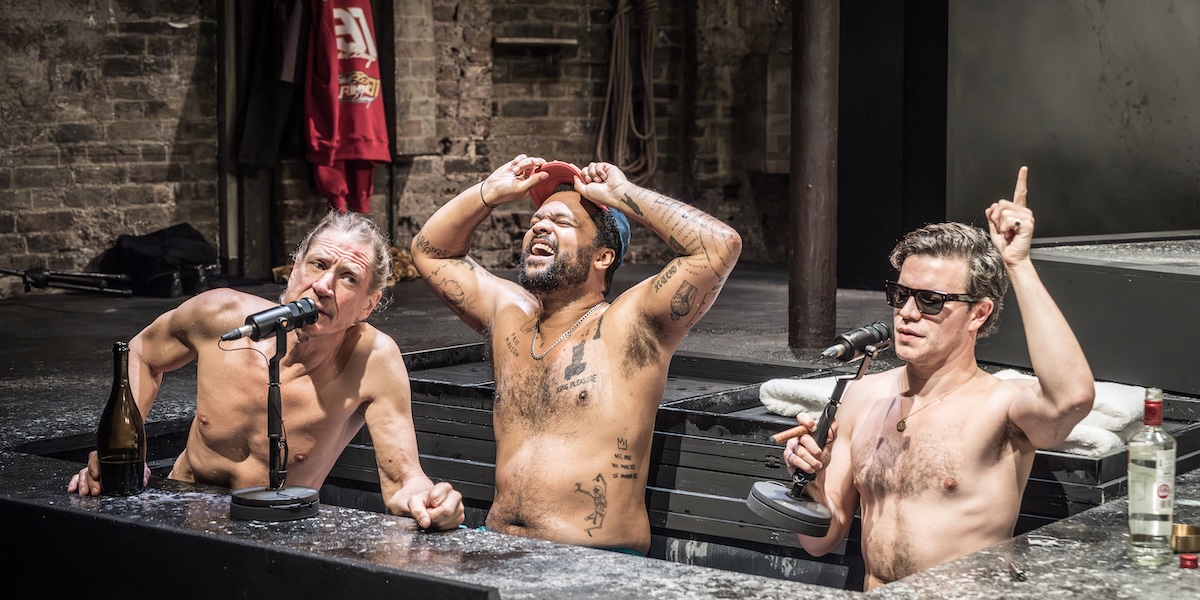'Romans: A Novel' review — Alice Birch's epic exploration of masculinity is brimming with ideas
Read our review of Romans: A Novel, starring Kyle Soller, Oliver Johnstone and Stuart Thompson, now in performances at the Almeida Theatre to 11 October.
Summary
- This ambitious play follows one family in its examination of men and toxic masculinity
- Alice Birch's work spans the First World War through to the contemporary manosphere
- Kyle Soller gives a particularly strong performance as a cult leader
Ten year-old Jack Roman (Kyle Soller) encounters his blood-soaked uncle in a field outside his house, and so begins Alice Birch's epic tale of three brothers navigating the changing face of masculinity across eras and literary styles.
Their father had always wanted boys, we're told in Jack's third-person narration, and after the deaths of four girls he got them. But what he got was three very disparate characters – aspiring author Jack, bullyboy Marlow (Oliver Johnstone), who responds to his brutal treatment at boarding school by becoming an empire-building billionaire, and shy, sensitive Edmund (Stuart Thompson).
It's a play brimful of ideas, spanning over a century, as the Roman story is carved into specific timezones. We traverse the First World War, 60s hippy movement, and the contemporary manosphere, all providing differing perspectives on the male condition. There are women, too, including Jack's frustrated wife (Agnes O'Casey) and a documentary filmmaker (Adelle Leonce) who seeks him out in a drug-taking cult he later forms. But, perhaps intentionally, they feel thinly drawn next to their outlandish male counterparts.

Directed with characteristic invention by Sam Pritchard, Birch's partner, there are points, particularly in the first half, when it is utterly absorbing. The wince-inducing boarding school scene (featuring a chilling portrayal of a sadistic headmaster by Jerry Killick) is grimly compelling, as are the subsequent disparate arcs of the brothers' trajectories. But there's also a strangeness and distance to it all, perhaps because the novelisation of playwriting feels at once poetical and arrhythmic.
The later scenes get heavily into the notion of toxic masculinity as Marlow becomes a Musk-esque billionaire fawned over by bros on a podcast, Jack gets cancelled for his cult-based abuses, and Edmund hosts workshops inviting men to heal their trauma by acting as animals. This feels a little too on the nose, a checklist of trends and modern male archetypes. But the final scene does draw the siblings back together against the backdrop of a coup de théâtre lighting effect from designer Lee Curran. And the implication seems clear: societies may change, but the cycle of neglect, abuse and emotional repression grinds on.
Soller, always such a magnetic stage presence, inhabits the growth of Jack from boyhood to literal cult hero, a man with the soul of a war poet and the ego of a film star. In many ways he's a mirror of Johnstone's cigar-puffing Marlow, who processes his trauma not with words but acquisitions. And Thompson's Edmund is the ideal foil to both, a boy who wears dresses for his alcoholic father and who grows into a reclusive societal outcast. The ensemble, which also includes Declan Conlon, Yanexi Enriquez and Olivier Huband, skilfully juggles a huge span of roles and genres.
Birch, who previously explored the feminist perspective in Revolt. She Said. Revolt Again., is one of our most ambitious and formally experimental writers, and it's great to see her back in the theatre. This near-three-hour sweep of the patriarchy in its various iterations is a piece that throws up no end of provocative moments and ideas. It will keep you talking long into the night. But it also feels baggy and unfocussed at times, a smorgasbord of ideas that never quite cohere into a satisfying whole.
Romans: A Novel is at the Almeida Theatre to 11 October.
Photo credit: Romans: A Novel (Photos by Marc Brenner)
Originally published on
